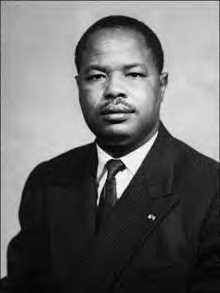- Ahmadou Ahidjo
Infobox President | name=Ahmadou Ahidjo
nationality=Cameroonian
caption=Ahmadou Ahidjo
order=1stPresident of Cameroon
term_start=1960
term_end=6 November 1982
predecessor=
successor=Paul Biya
religion=
birth_date=birth date|1924|8|24|df=y
birth_place=Garoua
death_date=death date and age|1989|11|30|1924|8|24|df=y
death_place=Dakar ,Senegal
spouse=
party=
vicepresident=
order2=1st Prime Minister of East Cameroon
term_start2=1 January 1960
term_end2=15 May 1960
predecessor2=
successor2=Charles Assalé
president=Ahmadou Babatoura Ahidjo (
24 August 1924 -30 November 1989 ) was the first President of Cameroon from 1960 until 1982.Biography
Born in
Garoua , he entered the politics ofFrench Cameroun during the 1940s. He was elected president of that country when it gained independence in 1960 as leader of theCameroon Union , and persuaded part ofBritish Cameroon to join his country. He was reelected in 1965, 1970, 1975 and 1980, gradually establishing the complete dominance of his own party and outlawing all others in 1976.He experienced a rebellion in the 1960s from a group known as the
Union of the Peoples of Cameroon , but defeated it by 1970. In the early 1970s he created an unpopular constitution which ended the autonomy of British Cameroon and established unitary rule. Though many of his actions were dictatorial, his country became one of the most stable in Africa.Ahidjo resigned, ostensibly for health reasons, on
4 November ,1982 (there are many theories surrounding the resignation; it is generally believed that his French doctor "tricked" Ahidjo about his health [ [http://www.waado.org/nigerian_scholars/archive/debates/constitution/OmoigCoup.html On The Question of Preventing Coups in Nigeria by Nowamagbe A. Omoigui ] ] [ [http://dawodu.com/bakassi3.htm The Bakassi Story ] ] ) and was succeeded by Prime MinisterPaul Biya two days later.Joseph Takougang, "The Nature of Politics in Cameroon", "The Leadership Challenge in Africa: Cameroon Under Paul Biya" (2004), ed. John Mukum Mbaku and Joseph Takougang, page 78.] That he stepped down in favor of Biya, a Christian from the south and not a Muslim from the north like himself, was considered surprising.Fact|date=June 2008 Ahidjo's ultimate intentions are unclear; it is possible that he intended to return to the presidency at a later point when his health improved, and another possibility is that he intended forMaigari Bello Bouba , a fellow Muslim from the north who succeeded Biya as Prime Minister, to be his eventual successor as President, with Biya in effectively a caretaker role.Fact|date=June 2008 Although the Central Committee of the rulingCameroon National Union (CNU) urged Ahidjo to remain president, he declined to do so, but he did agree to remain as the leader of the CNU. However, he also arranged for Biya to become the CNU vice-president and handle party affairs in his absence. Additionally, in January 1983, Ahidjo travelled across the country in a tour in support of Biya.Milton H. Krieger and Joseph Takougang, "African State and Society in the 1990s: Cameroon's Political Crossroads" (2000), Westview Press, pages 65–73.]Later in 1983, a major feud developed between Ahidjo and Biya. On
July 19 1983 , Ahidjo went into exile inFrance , and Biya began removing Ahidjo's supporters from positions of power and eliminating symbols of his authority, replacing Ahidjo's portraits with his own and removing Ahidjo's name from the anthem of the CNU. OnAugust 22 , Biya announced that a plot allegedly involving Ahidjo had been uncovered. For his part, Ahidjo severely criticized Biya, alleging that Biya was abusing his power, that he lived in fear of plots against him, and that he was a threat to national unity. The two were unable to reconcile despite the efforts of several foreign leaders, and Ahidjo announced onAugust 27 that he was resigning as head of the CNU. In exile, Ahidjo was sentenced to death "in absentia " in February 1984, along with two others, for participation in the June 1983 coup plot, although Biya commuted the sentence to life in prison. Ahidjo denied involvement in the plot. A violent but unsuccessful coup attempt in April 1984 was also widely believed to have been orchestrated by Ahidjo.Jonathan C. Randal, [http://www.washingtonpost.com/wp-dyn/content/article/2006/07/19/AR2006071901340_pf.html "Tales of Ex-Leader's Role In Revolt Stun Cameroon"] , "The Washington Post", April 15, 1984, page A01.]In his remaining years, Ahidjo divided his time between France and
Senegal . He died inDakar .References
Wikimedia Foundation. 2010.
